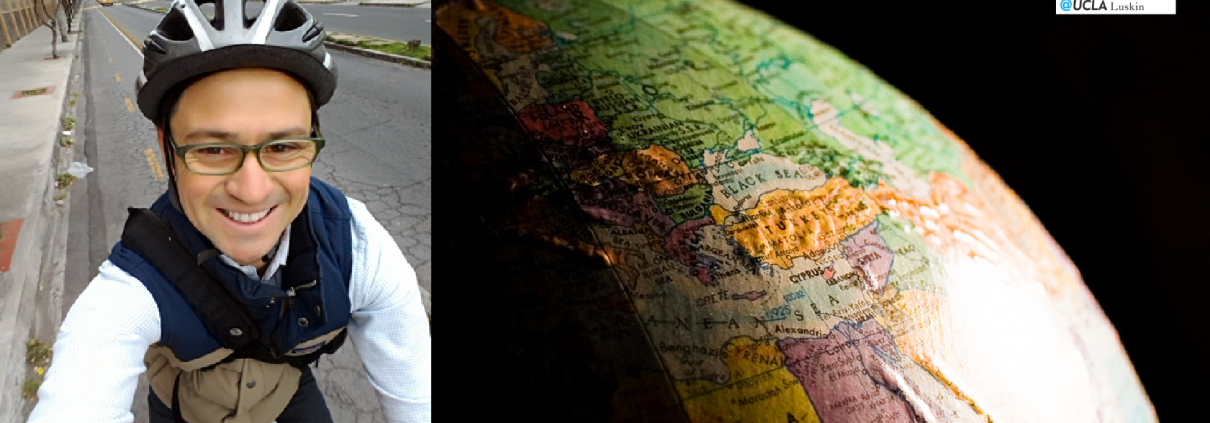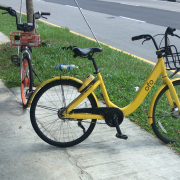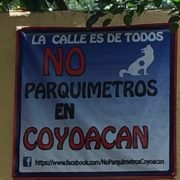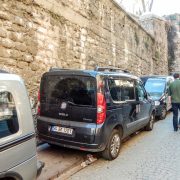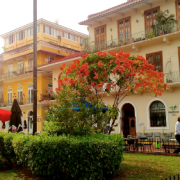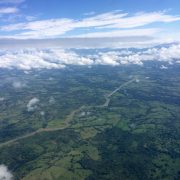An Alumni Q&A with Ramiro Alberto Ríos MA UP ’10
Ramiro Alberto Ríos (Urban Planning M.A. 2010) is a Transport Consultant at the World Bank who specializes in urban and sustainable transport. His most recent project includes the development of an Urban Rail Project Implementation Guidebook to inform decision makers and Metro implementing agencies about the most important issues and challenges of planning, constructing, operating and maintaining urban rail projects, particularly Metro rail. Prior to his appointment at The World Bank, Ramiro served as a Transport Consultant to the Inter-American Development Bank (IADB). During his time at the IADB, he supported the preparation and implementation of multi-billion-dollar transport loans to support construction of Metro Projects in Lima, Peru and Quito, Ecuador, incorporated economic, social and environmental sustainability indicators in transport loan projects for all member countries, and developed knowledge products to improve sustainability of transport projects, including tools and guides for improving bicycling, walking and public transport utilization. During the last 7 years, Ramiro has lived and worked in the United States, Brazil, Bolivia and Ecuador, and has worked in more than a dozen countries in Latin America and Asia.
The following interview is an edited Q & A transcript with Luskin alumnus Ramiro Alberto Ríos (Urban Planning M.A. 2010)
Why did you choose to study at UCLA Luskin?
I completed my undergraduate work at UCLA in international development with a focus on development economics. During this time, I was involved with several organizations on campus that were getting their hands on real development experience. We organized a group of undergraduates to study a case of monopsony that was affecting very low-income coffee growers in the deep mountains of Honduras. We developed solutions to help them sell their coffee at higher prices. These experiences, the like-minded individuals UCLA, and the overall “do it yourself” spirit of the school made UCLA the most valuable option to study a Master’s degree.
Did UCLA live up to your expectations?
At UCLA I found support, motivation and academic and professional tools that helped me achieve my short, medium and long-term goals. UCLA was a support platform in terms of finding jobs (on and out of campus), developing intellectual relationships with peers and professors, and gave me the skills I needed to pursue a career in International Development and Transportation Planning. The University met my expectations and even beyond.
Who were some of your favorite academics?
Some of my favorite academics during my Master’s work were: Stephen Commins, Michael Storper, Brian Taylor and Donald Shoup. I believe that both Steve and Michael have great experience working at the international development level, something I was quite interested in during my time at UCLA. Steve always had great insight on international organizations and their role in development, which helped me develop strategies and identify opportunities for me to work in these organizations. Professor Storper’s knowledge about regional economics helped direct my attention to transport supply and its effect on economic well-being through improved mobility and accessibility. Professor Taylor’s knowledge of public transport investment and operation and maintenance in the United States sparked many questions that I was very interested in exploring for developing countries. Finally, professor Shoup’s work motivated me to work on Parking Management in Latin America. Other professors at UCLA also motivated some of my work on Greenhouse Gas emissions mitigations strategies for the transport sector and other Climate Change-related work.
What are some of your fondest memories from your time at UCLA?
Some of the best memories I have from UCLA are related to the multi-disciplinarity of my studies. While working on my undergraduate degree, I was able to learn from various departments (e.g. international institute, economics, sociology, history etc). While completing my M.A., some of the best courses I took were in the Law School (International Climate Law) and the Engineering department (Transport Engineering 1 & 2). This also helped me make friends across campus and have interesting points of view beyond Urban Planning and Public Policy.
What led you to pursue a career in urban planning, and how has your work/interests evolved since your time at Luskin?
Coming from UCLA undergraduate, I was very interested in international economic development. Transportation and mobility always attracted my attention because increasing mobility and access enables increasing economic and social opportunities, especially for low-income households in poor countries. My interests have not evolved a great deal since I am still interested in contributing to improve mobility, access, and economic opportunities for public transport users in the developing world. The only change in my work is that I have been focusing more and more in megaprojects (Projects usually over US$ 500 million with high complexity).
Students will be interested to know about your current work around transportation in Latin America and in developing countries around the world. What is the nature of your work? What do you enjoy about it? What have been some of the challenges and how did you overcome them?
Before working at the IADB, I worked for the Institute for Transportation and Development Policy (ITDP). A non-profit organization that works on improving urban transport around the world. At ITDP I developed a set of tools and a passion for reducing negative externalities (greenhouse gases (GHG), air pollutants, traffic accidents, etc) from the urban transport sector. I am convinced that active mobility and public transport are the solution, so when I moved to work to the Multilateral Organizations (MDBs) I ensured to bring this mobility paradigm and try to integrate it in their transport projects.
At IADB my work was to lead the Regional Environmental Sustainable Transport Initiative, which
promoted more sustainable transport in Latin America and the Caribbean (LAC) Countries. The objectives were to develop tools and guidelines that decision makers could use to improve mobility and increase sustainability in the urban transport sector and integrate the knowledge produced in Bank-funded projects. While working there I co-wrote several publications on reducing travel demand, managing parking, developing strategies to reduce GHGs, and publications related to improving bicycling so that it becomes an every-day transport option to people in cities in LAC. Furthermore, my work also included the development and application of a Rating System (initially developed by the Asian Development Bank). This rating system was utilized at IADB to rate the sustainability of each project, and learn how sustainability could be improved from project to project. The rating system included economic, social and environmental indicators that are very helpful to track improvements in sustainability.
Currently at The World Bank, I am managing the development of a Guidebook targeted to decision makers and urban rail project implementers on what should be considered before, during and after implementing an urban rail project, mainly Metro Rail Projects. The book contains 17 Chapters from what should be considered before deciding to build an urban rail project, what are the social, economic and environmental impacts of building such project, what is the private sector’s role in developing and financing an urban rail project and how should a rail project be developed sustainably.
I am a natural problem solver, I enjoy working with people on figuring out how to solve their problems. I enjoy helping managers and team leaders thinking through how to do things better, more effectively and efficiently. I also enjoy the topic of developing projects and guidelines to improve sustainable transport, active transport and in general, improving mobility for people in cities around the world.
Some of the most notable challenges in my career have been dealing with different people and personalities. There is always more than one solution to a problem, and every one of us thinks differently about the world. It is very important to be open-minded, to be kind, patient and understanding to attain goals and objectives at work.
For more information about some of the topics related to my work (in Spanish) visit:
http://blogs.iadb.org/moviliblog/author/rarios/
The aim of Global Public Affairs @ UCLA Luskin, is to prepare students intellectually and professionally to navigate the rapidly-changing, increasingly interconnected global world we live in. How do you see your work as relating to or benefiting from a global perspective?
My work is in nature global. Developing tools and guidelines for improving urban transport in an organization such as The World Bank ensures that such knowledge is accessible for decision makers and implementors in every country around the world. At the same time, in the age of big data and vast amounts of information, improvements in urban transport can be shared from city-to-city, and international organizations play an important role in sharing such knowledge with everyone around the world.
Similarly, what advice do you have for students who seek to become “global citizens”?
I think that students should think beyond city and regional borders, get out there! Sharing experiences and knowledge globally is more of a reality now more than ever and if you want to be a global change agent, you should learn from experiences around the world. Living and working abroad has changed the way I think about the world and has helped me better understand the new challenges and opportunities that globalization has enabled in our planet.

